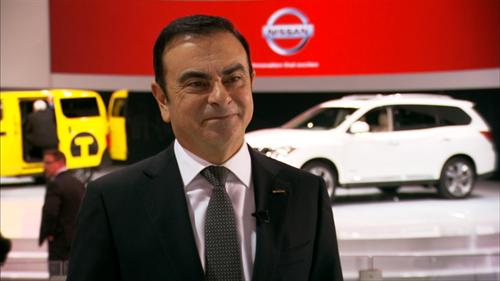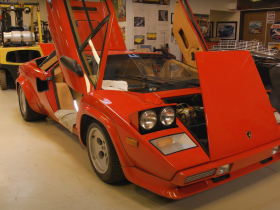The CEO of Nissan, Carlos Ghosn, talks about the company’s strategies, including its foray into electric vehicles. Here is video of the interview as well as a transcript with Carlos Ghosn:
Q1: In your recent presidential address you noted that Nissan had several areas where they needed improvement and you called for smart discipline. What is that smart discipline?
Carlos Ghosn: Discipline is about having processes, well done processes, well optimized processes and executing on them. That is what discipline is about. Our industry is extremely complicated. We {Nissan Motor Company} have 64 products, that we offer globally, each one of them is made by 4000 parts, they are sourced from all over the world. This requires a lot of organization, it requires a lot of processes, it requires a lot of training, it requires a lot of expertise. So we need to make sure that we have adequate processes, simplified processes and that we are very disciplined in the way we execute on them. So, that’s number one. And, we see today that in the car industry the companies who are doing the best are the companies issued from a culture of discipline, a culture of respect for processes.
Smart means that we need, before we put something into execution, to make sure that first we are going in the right direction. Second, that it has been thoughtfully planned, simplified, with a good purpose, so it can be executed well.
So the smart is about the planning, is about the strategy, is about the buying in. And then the discipline is about the execution and the process. And frankly, when we look at all the shortfall, all the disappointments we had in the year 2012, many of them if not all of them can be related to the fact that we have not been smart enough or that we have not been disciplined enough. And, again it’s not that we did not progress in 2012. We made a lot of progress in 2012; but if we want to look at how can we do better, how can we make Nissan a better company in the future, we obviously have to be much more focused on how to act smarter and plan in a way which is better for a better change.
Q2: Nissan is normally very good in times of crises; for example, in 2011 in Japan after the earthquake and tsunami. How is Nissan in times of more economic stability? Does that require a new mindset?
Carlos Ghosn: Well you know, obviously all the attributes that makes us strong in time of crises, are also useful in normal times. But normal times require something more than what is required in period of crises. You have a company that are doing very well in normal times, who are not very good in times of crises and you have also the reverse. But the best, is to be able to do both, I mean to do really be better than the competition in normal times and at the same time respond very well in times of crises. This requires different attributes. But I would say if we come back to smart discipline, smart discipline is particularly adapted to normal times because what you need is engagement, you need motivation, you need responsiveness, you need not to be afraid about what’s taking place, particularly have this mentality about how what can we do about it, this is a competitive game. How can I do better than my competitor and this Nissan already has and it is very strong.
Q3: How has the Nissan Leaf boosted the brand or has it been more of a barrier thus far.
Carlos Ghosn: The Nissan Leaf without any doubt is an asset for the brand, globally. It projects an image of a company which cares about the environment, it projects an image of a company which is capable of breakthrough in terms of technology. It is also synonymous of a company which dares going into places and tackling products that nobody has tackled before. I think it is great for the brand. Now we need to transform it from a technological feat to a sales performance. This is a transformation that we need to do. I think we have a great car, we have a great technology. It is a car, which is a car of the times that we are living in. It corresponds to all the challenges that we are facing. The main challenge now is to sell. But without any doubt it is a strong asset for the brand, particularly if we transform it into a big sales success. And we have time for that.
Q4: And building on what you said, you know sometimes being out front seems to create more criticism, in terms of the Leaf, in terms of the New York taxi and in terms of autonomous and connected vehicles, is that something you are concerned about at all?
Carlos Ghosn: I think it is part of the job. Every time you are trying to do something innovative you’re being criticized and you know you’re facing a lot of scepticism, you can face a lot of hostility, you can have all your competitors jamming on you, it’s normal. This is a normal process and I’m seeing it happening for anybody who is trying something innovative or something which does not correspond to exactly what competitors are doing. We just have to be patient, resilient, not be shaken by the criticism. On the contrary, being strengthened by this criticism, having the will to defend our product to defend our brand, to defend our company. And as long as we do that and as long as we always tune this strategy, adapt the strategy to the evolution of the environment, we will prevail. So for example, both in the case of the New York taxi or in the case of the electric car and the zero emission cars, I think we are on the right path, the right strategy. Being criticized is normal, we just are going to have to deliver and show the potential of these undertakings.
Q5: In the coming year what are the biggest opportunities for Nissan?
Carlos Ghosn: I think mainly it is about a great use of everything we have invested in. It is about effectiveness and it is about efficiency. This is the main thing in 2013, because we are investing a lot, we are bringing a lot of products, we are developing a lot of technology, we’re expanding the company. I mean the strategy is giving us a lot of tools. The main challenge is how far can we bring it, how effective are we going to put this at work for us. Mainly it is about effectiveness and efficiency, and frankly I think we have a lot of talent and a lot of experience to put this at work for us.








